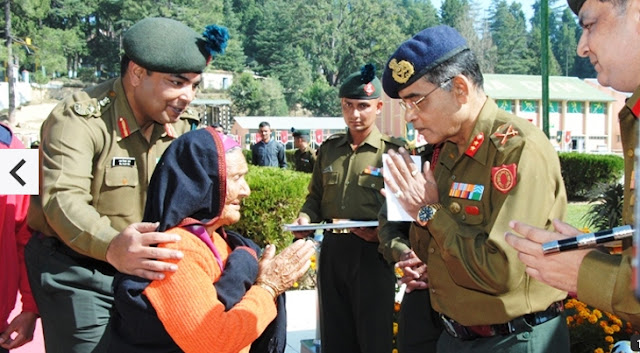HOW India was BROKEN DOWN OVER TIME
SEVEN
times in 61 years by the British rule.
Afghanistan was separated from India in 1876,
Nepal in 1904,
Bhutan in 1906,
Tibet in 1907,
Sri Lanka in 1935,
Myanmar (Burma) in 1937
and... Pakistan in 1947.
The Partition of Akhand
Bharat
Unbroken India extended from the Himalayas to the
Indian Ocean and from Iran to Indonesia. India’s area in 1857 was 83 lakh
square kilometers, which is currently 33 lakh square kilometers.
Sri Lanka
The British separated Sri Lanka from India in 1935. The
old name of Sri Lanka was Sinhaldeep. The name Sinhaldeep was later renamed
Ceylon. Sri Lanka’s name was Tamraparni during the reign of Emperor Ashoka.
Mahendra, son of Emperor Ashoka and daughter Sanghamitra went to Sri Lanka to
propagate Buddhism. Sri Lanka is a part of united India.
Afghanistan
The ancient name of Afghanistan was Upganasthan and
Kandahar’s was Gandhara. Afghanistan was a Shaivite country. The Gandhara
described in the Mahabharata is in Afghanistan from where the Kauravas’ mother
was Gandhari and maternal uncle Shakuni. The description of Kandahar i.e.
Gandhara is found till the reign of Shah Jahan. It was a part of India. In 1876
Gandamak treaty was signed between Russia and Britain. After the treaty,
Afghanistan was accepted as a separate country.
Myanmar (Burma)
The ancient name of Myanmar (Burma) was Brahmadesh. In
1937, the recognition of a separate country to Myanmar i.e. Burma was given by
the British. In ancient times, the Hindu king Anandavrata ruled here.
Nepal
Nepal was known as Deodhar in ancient times. Lord
Buddha was born in Lumbini and mother Sita was born in Janakpur which is in
Nepal today. Nepal was made a separate country in 1904 by the British. Nepal
was called the Hindu nation of Nepal.
Nepal was called as Hindu Rashtra Nepal. Until a few years ago, the king
of Nepal was called Nepal Naresh. Nepal has 81 percent Hindus and 9% Buddhists.
Nepal was an integral part of India during the reigns of Emperor Ashoka and
Samudragupta. In 1951, Maharaja Tribhuvan Singh of Nepal appealed to the then
Prime Minister of India, Pandit Jawaharlal Nehru to merge Nepal with India, but
Jawaharlal Nehru rejected the proposal.
Thailand
Thailand was known as Syam until 1939. The major cities
were Ayodhya, Shri Vijay etc. The construction of Buddhist temples in Syam began
in the third century. Even today many Shiva temples are there in this country.
The capital of Thailand Bangkok also has hundreds of Hindu temples.
Cambodia
Cambodia is derived from the Sanskrit name Kamboj, was
part of unbroken India. The Kaundinya dynasty of Indian origin ruled here from
the first century itself. People here used to worship Shiva, Vishnu and Buddha.
The national language was Sanskrit. Even today in Cambodia, the names of Indian
months such as Chet, Visakh, Asadha are used. The world famous Ankorwat temple
is dedicated to Lord Vishnu, which was built by the Hindu king Suryadev Varman.
The walls of the temple have paintings related to the Ramayana and the
Mahabharata. The ancient name of Ankorwat is Yashodharpur.
Vietnam
The ancient name of Vietnam is Champadesh and its
principal cities were Indrapur, Amravati and Vijay. Many Shiva, Lakshmi,
Parvati and Saraswati temples will still be found here. Shivling was also
worshiped here. The people were called Cham who were originally Shaivites.
Malaysia
The ancient name of Malaysia was Malay Desh which is a
Sanskrit word which means the land of mountains. Malaysia is also described in
Ramayana and Raghuvansham. Shaivism was practiced in Malay. Goddess Durga and
Lord Ganesha were worshiped. The main script here was Brahmi and Sanskrit was
the main language.
Indonesia
The ancient name of Indonesia is Dipantar Bharat which
is also mentioned in the Puranas. Deepantar Bharat means the ocean across
India. It was the kingdom of Hindu kings. The largest Shiva temple was in the
island of Java. The temples were mainly carved with Lord Rama and Lord Krishna.
The Bhuvanakosh is the oldest book containing 525 verses of Sanskrit.
The names or motos of the leading institutions of
Indonesia are still in Sanskrit :
Indonesian Police Academy – Dharma Bijaksana Kshatriya
Indonesia National Armed Forces – Tri Dharma Ek Karma
Indonesia Airlines – Garuda Airlines
Indonesia Ministry of Home Affairs – Charak Bhuvan
Indonesia Ministry of Finance – Nagar Dhan Raksha
Indonesia Supreme Court – Dharma Yukti
Tibet
The ancient name of Tibet was Trivishtam which was
divided into two parts. One part was given to China and the other to Lama after
an agreement between the Chinese and the British in 1907. In 1954, India’s Prime
Minister Jawaharlal Nehru accepted Tibet as part of China to show his
solidarity to Chinese people.
Bhutan
Bhutan was separated from India by the British in 1906
and recognized as a separate country. Bhutan is derived from the Sanskrit word
Bhu Utthan which means high ground.
Pakistan
There was partition of India on August 14, 1947 by the
British and Pakistan came into existence as East Pakistan and West Pakistan.
Mohammad Ali Jinnah had been demanding a separate country on the basis of
religion since 1940 which later became Pakistan. In 1971 with the cooperation
of India, Pakistan was divided again and Bangladesh came into existence.
Pakistan and Bangladesh were parts of India.

